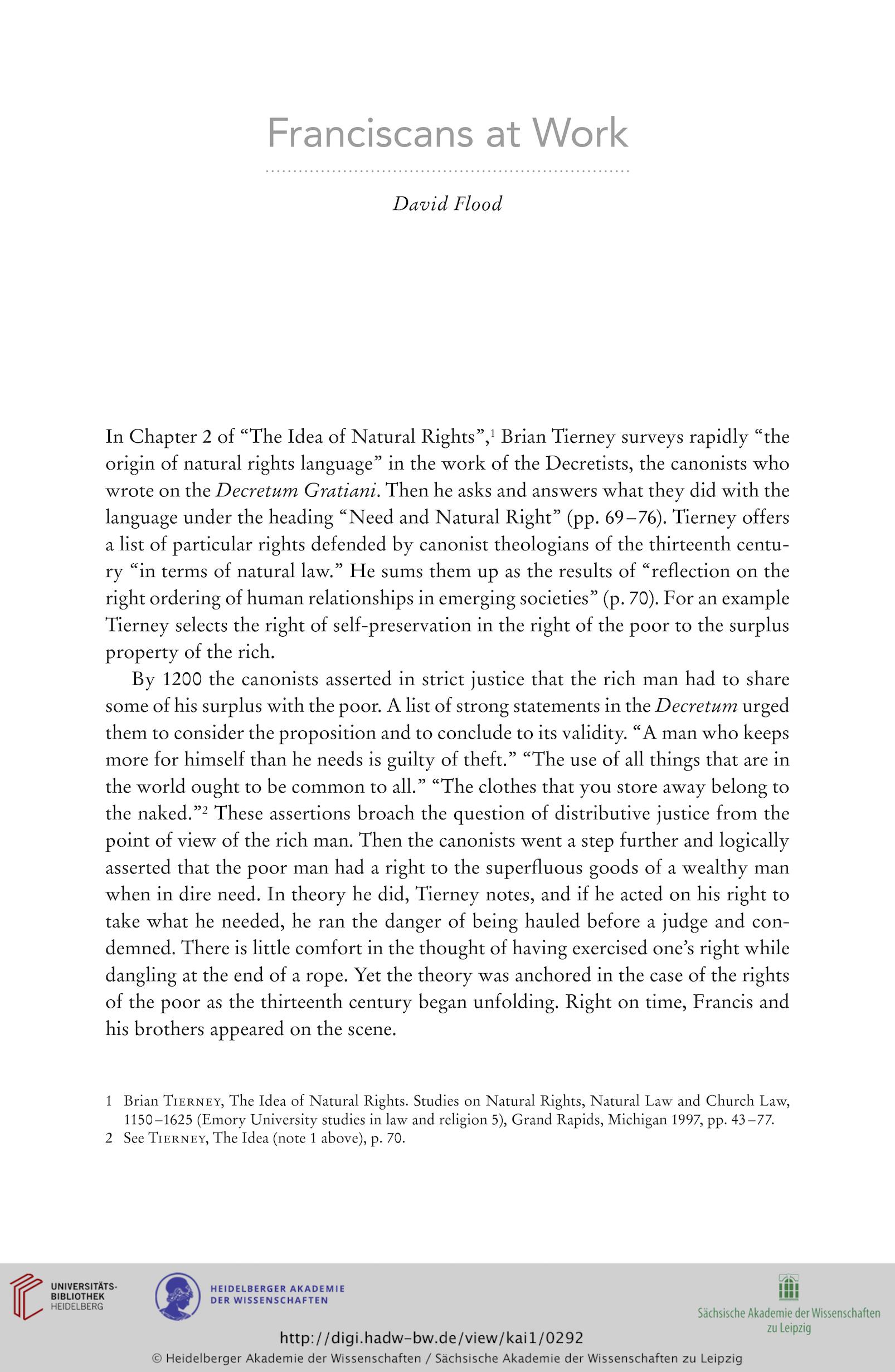Franciscans at Work
David Flood
In Chapter 2 of “The Idea of Natural Rights”, ¹ Brian Tierney surveys rapidly “the
origin of natural rights language” in the work of the Decretists, the canonists who
wrote on the Decretum Gratiani. Then he asks and answers what they did with the
language under the heading “Need and Natural Right” (pp. 69 –76). Tierney offers
a list of particular rights defended by canonist theologians of the thirteenth century
“in terms of natural law.” He sums them up as the results of “reflection on the
right ordering of human relationships in emerging societies” (p. 70). For an example
Tierney selects the right of self-preservation in the right of the poor to the surplus
property of the rich.
By 1200 the canonists asserted in strict justice that the rich man had to share
some of his surplus with the poor. A list of strong statements in the Decretum urged
them to consider the proposition and to conclude to its validity. “A man who keeps
more for himself than he needs is guilty of theft.” “The use of all things that are in
the world ought to be common to all.” “The clothes that you store away belong to
the naked.” ² These assertions broach the question of distributive justice from the
point of view of the rich man. Then the canonists went a step further and logically
asserted that the poor man had a right to the superfluous goods of a wealthy man
when in dire need. In theory he did, Tierney notes, and if he acted on his right to
take what he needed, he ran the danger of being hauled before a judge and condemned.
There is little comfort in the thought of having exercised one’s right while
dangling at the end of a rope. Yet the theory was anchored in the case of the rights
of the poor as the thirteenth century began unfolding. Right on time, Francis and
his brothers appeared on the scene.
1 Brian Tierney, The Idea of Natural Rights. Studies on Natural Rights, Natural Law and Church Law,
1150 –1625 (Emory University studies in law and religion 5), Grand Rapids, Michigan 1997, pp. 43 –77.
2 See Tierney, The Idea (note 1 above), p. 70.
David Flood
In Chapter 2 of “The Idea of Natural Rights”, ¹ Brian Tierney surveys rapidly “the
origin of natural rights language” in the work of the Decretists, the canonists who
wrote on the Decretum Gratiani. Then he asks and answers what they did with the
language under the heading “Need and Natural Right” (pp. 69 –76). Tierney offers
a list of particular rights defended by canonist theologians of the thirteenth century
“in terms of natural law.” He sums them up as the results of “reflection on the
right ordering of human relationships in emerging societies” (p. 70). For an example
Tierney selects the right of self-preservation in the right of the poor to the surplus
property of the rich.
By 1200 the canonists asserted in strict justice that the rich man had to share
some of his surplus with the poor. A list of strong statements in the Decretum urged
them to consider the proposition and to conclude to its validity. “A man who keeps
more for himself than he needs is guilty of theft.” “The use of all things that are in
the world ought to be common to all.” “The clothes that you store away belong to
the naked.” ² These assertions broach the question of distributive justice from the
point of view of the rich man. Then the canonists went a step further and logically
asserted that the poor man had a right to the superfluous goods of a wealthy man
when in dire need. In theory he did, Tierney notes, and if he acted on his right to
take what he needed, he ran the danger of being hauled before a judge and condemned.
There is little comfort in the thought of having exercised one’s right while
dangling at the end of a rope. Yet the theory was anchored in the case of the rights
of the poor as the thirteenth century began unfolding. Right on time, Francis and
his brothers appeared on the scene.
1 Brian Tierney, The Idea of Natural Rights. Studies on Natural Rights, Natural Law and Church Law,
1150 –1625 (Emory University studies in law and religion 5), Grand Rapids, Michigan 1997, pp. 43 –77.
2 See Tierney, The Idea (note 1 above), p. 70.







